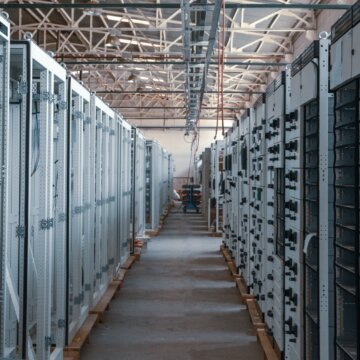- About
- Topics
- Story
- In-Depth
- Picks
- Opinion
- News
- Donate
- Signup for our newsletterOur Editors' Best Picks.Send
Read, Debate: Engage.
| topic: | Sustainable Development |
|---|---|
| located: | Ireland, Netherlands |
| editor: | Abby Klinkenberg |
As the power and profit of digital economy giants continue to boom, so does the demand for more robust digital infrastructure capable of handling all of the streaming, ordering and cloud computing common to this brave new world. Europe is no exception to this trend: European data centre revenues are forecasted to increase by 57 percent, from €11.1 billion to €17.5 billion, between now and 2026. While data centres and hyper-scales are projected to flourish in Europe’s immediate future, recent developments in Ireland and the Netherlands suggest that environmental considerations are making progress in destabilising the plans of the juggernaut of Big Tech development.
In the face of projections that Ireland would be the fastest-growing market for hyperscale data centres in western Europe through 2028, Irish officials decided to stake out a new course last week. On 24 May, 2022, Ireland’s national electricity operator EirGrid announced that plans for 30 Irish data centre projects would be abandoned due to concerns relating to national grid capacity. Currently, data centres drain over 10 percent of the country’s electricity supply, a figure that is slated to rise to 30 percent by 2030. Such a rapid growth trend would all but destroy Ireland’s decarbonisation plans (to ensure that 80 percent of electricity comes from renewables by 2030) and also poses the threat of rolling blackouts across the country.
EirGrid’s recent pronouncement builds upon a November 2021 decision by Ireland’s Commission for Regulation of Utilities to instate a de facto moratorium on data centre construction through 2028 on the grounds that the country’s renewable energy capacity could not keep pace with new data centre needs. Until last week, the assumption was that these limitations would only apply to the Dublin metropolitan area. Now the moratorium has extended throughout the country, upsetting tech giants in the process. Google, for instance, has stated that Ireland’s electricity curbs have rendered its data centre development plans “impossible.”
Ultimately, Ireland has chosen to protect its ambitions to ensure that 80 percent of its electricity comes from renewables by 2030 as part of its decarbonisation efforts. These developments are signs that the country’s climate goals are being prioritised over profits.
Looking at mainland Europe, the Netherlands is also facing backlash related to its emergence as a data centre powerhouse. As of 2022, the Netherlands is home to 280 data centres, only behind Germany’s 484 but concentrated in far smaller geography, and the country has plans to build 20 to 25 new or expanding projects in the near future. But recently, in February 2022, the Dutch government moved to halt the construction of new hyperscale data centres across the country for nine months pending new regulations. All new projects were banned with a few exceptions, the most notable being Meta’s Zeewolde location, which would be the largest in the country.
Among the many environmental concerns associated with the Zeewolde project was that of water quality: a spokesperson for LTO Noord, a local agricultural business association, shared that “local canal water would be used for cooling [the data centre], but to protect the cooling systems it will be treated with chemicals, then returned to the canal… we have no guarantee it will be clean.” In March 2022, Zeewolde garnered international attention after the activism of residents and the defeat of local elected officials ultimately caused Meta to “pause” the project - a tremendous victory for the town’s 22,000 residents and environmental champions everywhere.
An EU Commission study revealed that data centres accounted for 2.7 percent of the bloc’s electricity demand in 2018 and this figure is expected to rise to 3.2 percent of total demand by 2030 (not including cryptocurrency mining or data transmission networks). As Big Tech continues to extend its data centre locations across the continent and the EU strives to better regulate data centre construction requirements, these developments in Ireland and the Netherlands suggest that environmental concerns have a fighting chance at stemming the profit-driven tide.
Photo by İsmail Enes Ayhan

